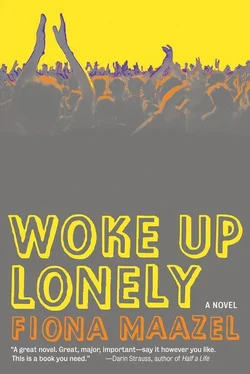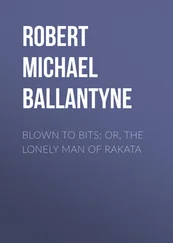I hate being here. This place is a clink. Three stories, fifteen rooms, stone facade, lintels. A Renaissance Revival in a corner of Ohio. See those windows? My head of security — his name is Dean — says they’re bulletproof, UV resistant, and self-tinting. I think my Murphy bed is some kind of escape vehicle. And at night, when I’m scrubbing my teeth with the electric toothbrush he gave me last month, I think it checks my vitals.
This part of Cincinnati was his choice, too. A couple miles north of the four-block nexus called downtown, with its stadiums and street-name blandishments, Rosa Parks Street and Freeman Avenue. Since 1990, people have been fleeing this town in droves. Mine was the first new place to go up in years, which meant that every contractor in town wanted in. And yesterday, when we needed extra rebar — because what is a kidnapping without a cell? — the material was here ASAP. Not that rebar is the incarcerating metal of choice — the stuff bends, after all — but the point is verisimilitude.
Dean called back to say Cinergy didn’t have any trucks with the plate number I gave him — no surprise there. And yet a little surprising. What sort of infiltration party was this?
I watched the four technicians clod through the snow. Their coveralls were insulated and bulky, so that one guy looked like he walked on the moon, another like he had a pillow between his legs. They’d come under the pretense of wanting to dislodge a manhole cover. Who had the crowbar?
The third tech was Indian and held his clipboard upside down. The girl had trouble with her tool belt. One of the guys stared up at the sky like maybe my house had launched itself there. The tech with pillow pants had a video camera. He held it to his eye with his index finger on the zoom. I looked at his face; he looked almost happy.
Next they hopped the fence and were closing in as though they meant to ring the bell. I thought about going out there myself. Instead, I buzzed for Norman, COO of the Helix, who seemed to have anticipated the call and was here in three seconds. In a double-breasted blazer and chinos. A button-down that fought with the insurgency of his waist. A tie and kerchief.
“I saw them,” he said. “Don’t worry.”
I could feel my Adam’s apple ascend but not come down. “Taking pictures,” I said. “We can’t have that.”
“It’s not a problem. And there’s nothing to see anyway. Just forget them. They’ll leave eventually.”
“And then what?”
Norman shrugged. He has a way of looking depressed no matter the context, as though his face were stuck in range of a vacuum hose hitched to his neck and always on. He is barely five-five, and alone with his color on this side of town. I’ve been told Cincinnati is the sixth-most segregated city in America, and to the extent that Norman is the only black man I’ve seen in months, I can only imagine what the first five are like.
“We go on with our work,” he said. “There’s an event with Pack 3, Colorado, in two days. You’re expected.”
“Our work,” I said, and I moved away from the window. How much was I really caring about our work? I tried to picture my daughter. She’d been so well bundled on the street, I could barely see her face. God knows what she must think of me. If she even knows I am alive, it’s possible she despises me in ways she feels without words but will put words to soon enough. She is almost ten, which is when your kid feelings petrify and cornerstone the prison that becomes your psychic life from then on.
I asked Norman if any of my people in D.C. had checked in. They had not. He wanted to know why, but I didn’t tell him. There are just some things you cannot share. Even with your oldest friend. Poor Norman. He’s been my wingman ever since we were kids. He has flirted with Centers for Change and Reevaluation Counseling, est and the Way, and lived in New York with Fred Newman’s crew on the Upper West Side. By the time he came to the Helix he was already steeped in a version of Manichaean paranoia: from his toil could develop an end to grief but in his sloth would be the demise of man. Talk about pressure.
He asked if we could just get on with the day. He said we had a lot to do.
And I knew he was right. I should forget about the techs, the snoops, the surveillance, and get on with my life. What I’m trying to say is: It’s not like I didn’t understand what this situation would do to Norman and the Helix. I even scanned his face and tried to find in its expression qualities that wouldn’t get trashed when this thing was over. I went: Hope, trust, loyalty, faith, and ticked off each one. But that didn’t stop me. Because what kind of life am I having without my family?
I said: “Norman, this is what I want. I want you to bring those four people in. They are trespassing. We can’t have it.”
“I’m sorry?”
“I want you to bring them in and keep them here until further notice.” And with that I turned my back on him, knowing that in some way, it’d be out of my hands from then on.
“But we don’t even know who they are. And we certainly don’t need that kind of attention. Florida just cleared five thousand. I’m going down there next week to make the Pack official.”
“Great. All the more reason to protect ourselves. Now just do what I say.”
His mouth opened, but he knew the discussion was over. He backed out of the room. His face seemed to drag across the floor.
On his way out, I told him to get them hoods. I didn’t want to see their faces, didn’t want to know their names.
Which brings me to the present. I now have four hostages I will gladly exchange for my wife and child. I will make a ransom tape and make my demands clear. But I don’t know if it will work, and if it doesn’t, then I would like to ask for something else, which is this: the chance to humanize this story so that among those for whom the expiry of my life will come as good news, there are two who might someday know of the sorrow wrought in my heart for them.
Thurlow put on his gym pants and a long-sleeved polyester crew and made for the sauna. Five pounds in five minutes, sweat therapy. He was what the professionals call TOFI: thin outside, fat inside. A skinny fat person, no muscle tone at all. His body fat percentage was 25, which he knew thanks to a medical resident, a dietician, who came once a fortnight to tell him how close he was to heart failure. She looked grim every time.
He opened the sauna door and found his crew waiting, as always, for the morning meeting. In attendance were Norman, Grant, Dean, in a sweat born of the excitement to which they were newly wed. That and the heat, 168 and rising. Norman wet the coals. The walls were Nordic spruce with burls that dilated in the grain if you stared at them too long. Thurlow sat on the top bench. His tennis socks were wet and printed the wood like flippers.
They’d had the hostages for twenty-four hours. Now it was time to deal.
Norman said, “I found a lighting crew in the area. And someone for hair and makeup. So how about we schedule filming for three o’clock — can we say three?” He swiped a finger across his brow and flicked what was there at the tile.
Dean’s voice surged above the wheezing stones. “I was hoping to get you first. For gear and training. It’s a brave new world. But we’re ready.”
Grant stared at his toes, which were bound in sandals and swelled with blood. He was the youngest there, twenty-nine and schooled in technologies that kept the Helix current. “We’re gonna need more bandwidth, that’s for shit sure. Our site’s gonna pop.”
“Totally ready,” Dean said, with fists upraised. “Bring it on.” He was dappled red in an allotment that seemed miserly in this context — it was 172 by now — but enviable the rest of the time. He never looked flustered; he was totally ready.
Читать дальше












